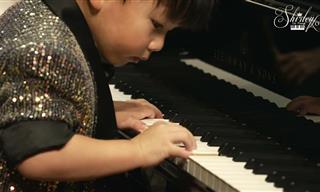

Suitable for kids in grades 3 to 12
Method: Dim the lights in a room, then after a few minutes look at the eyes of another person and note the size of their pupils. After this exercise, turn the room lights back on and check the size of the pupils again. The pupils should now be smaller.
Why do this exercise: This is the pupillary response, whereby it automatically keeps out excessive light that may damage the eye.

Suitable for kids in grades kindergarten to 12
Method: Start off by talking to your kids about how the brain and the rest of the nervous system controls movement. Without a warning, slam a book on a table creating a loud noise. Ask your kids who: twitched, moved their heads, blinked their eyes, put their hands up and screamed.
Why do this exercise: Reflexes protect the body automatically. They keep us away from objects that might hurt us.

Suitable for kids in grades 6 to 12
Method: This popular reflex pose is common at the doctor's office. In this test, the doctor hits your knee at a spot just below your knee cap causing your leg to kick out. This exercise should be done in pairs. Ask your partner to sit on a chair, ideally with their legs dangling down. Hit the leg just below the knee with the side of your hand, causing the leg to kick out immediately.
Why do this exercise: This reflex is called a monosynaptic reflex as there is only one synapse in the circuit needed to complete the reflex. It only takes about 50 milliseconds between the tap and the start of the leg kick. The tap below the knee causes the thigh muscle to stretch. Information is then sent to the spinal cord. After one synapse in the ventral horn of the spinal cord, the information is sent back out to the thigh muscle that then contracts.

Suitable for kids in grades 3 to 9
Method: This exercise shows how our reflexes are there to protect us. Ask someone to stand behind a see-through barrier, like a window or a windscreen then throw a cotton ball at the person. Did they blink? Chances are that they did.
Why do this exercise: This reflex test shows how our reflexes protect us. In this case, it serves to protect our eyes from damage.

Suitable for kids in grades kindergarten to 12
Method: This exercise does not test simple reflex. Rather, it is an activity designed to measure your response time to something that you see. For this exercise you need a ruler holding it at the end (the highest number) and letting it hang down. Another person should put his or her hand at the bottom of the ruler, having them ready to grab it. This person, however, should not be touching the ruler. Inform the other person that you will drop the ruler sometime within the next 5 seconds. Tell them that they are supposed to catch the ruler as fast as they can from the moment it has been dropped.
Take note of the level, in inches or centimeters, that the ruler has been dropped (using the chart below to track the time). Test the person 3 to 5 times, varying the time of dropping the ruler with the 5-second drop zone. To convert their reaction time, use the table below:
Distance Time
2 in (~5 cm) - 0.10 sec (100 ms)
4 in (~10 cm) - 0.14 sec (140 ms)
6 in (~15 cm) - 0.17 sec (170 ms)
8 in (~20 cm) - 0.20 sec (200 ms)
10 in (~25.5 cm) - 0.23 sec (230 ms)
12 in (~30.5 cm) - 0.25 sec (250 ms)
17 in (~43 cm) - 0.30 sec (300 ms)
24 in (~61 cm) - 0.35 sec (350 ms)
31 in (~79 cm) - 0.40 sec (400 ms)
39 in (~99 cm) - 0.45 sec (450 ms)
48 in (~123 cm) - 0.50 sec (500 ms)
69 in (~175 cm) - 0.60 sec (600 ms)

DIY Crafts With Fall Leaves
A collection of DIY projects using fall leaves, including preservation methods.

If You Pride Yourself On General Knowledge Take This Quiz!
This quiz will undoubtedly put your general knowledge to the test, so watch out for being overconfident before taking it!

How to Get Your Kid to Open Up About Their Day
Why do your kids or grandkids avoid talking about their day? How to get them to open up?

When Pets and Toddlers Act Silly, We Can’t Help But Laugh!
Who's better at making us smile than pets and kids, especially when they're acting a bit silly?
 7:19
7:19
Meet 12 Year Old Gymnastics SUPERSTAR Chandler King
At the age of 12, Chandler King is recognized as a rising star in the world of gymnastics and has her eyes set on Olympic gold. This is her story.

Surprise Your Kids With This Fake Snow Recipe!
Learn how to make your very own snow from the comfort of your own home thanks to this brilliant guide.

15 Amazing Items of the Past People Found in Their Homes
The nooks and crannies of our homes may contain some really fascinating vintage items...
 6:15
6:15
John Williams Conducts the Theme Song from “Jurassic Park”
Watch legendary composer enthrall the audience as he conducts the famous theme music from “Jurassic Park”.
 6:38
6:38
These Flying Shaolin Monks Are Incredible
An amazingly beautiful sight in super slow mo...
 14:44
14:44
Former FBI Agent Explains Basics Of Body Language Reading
Former FBI agent teaches you how distance, gestures and other nonverbal elements can reveal information about a person you're talking to

From Beans to Bar: How Chocolate is Made from Scratch...
Ever wondered how chocolate was made from beans to bar? Well, this collection of photographs will reveal all.

Service Dogs Are the Most Loyal & Courageous of Creatures
These 20 photos stand as a testament to the courage and devotion of service dogs, which have fought with and served humans throughout our history.

12 Unusual Ancient Currencies You Probably Never Hear Of!
With no credit cards and cash around, what did the people of the past use to buy things? It turns out that the list of objects used as ancient currencies is quite surprising!

15 Common Words You Are Pronouncing WRONG
Here is a list of some of the most common English words that are generally mispronounced by a majority of us.

These Inventors Absolutely Hate Their Creations
These 7 inventions became world famous and even world changing... yet their inventors deeply regret them.
 5:48
5:48
Watch This Dog Reunited With Her Owner. Bring a Hanky.
A video of Little Luna the dog being rescued by Hope For Paws and reunited with her owner.

Here Are Some Great Greetings to Send This CHRISTMAS!
Christmas is the most wonderful time of the year. Let your loved ones know that you're thinking of them this holiday season by sending one of these greetings.
 4:09
4:09
Goodbye, Diane: Remembering Diane Keaton
A look back at the extraordinary life of a singular artist who has left an indelible mark on Hollywood and our hearts.

Get Lost in These 15 Surreal Optical Illusions!
After looking at these weird optical illusions you might never trust your eyes again.

Incredible Story: The Woman Who Can SMELL Parkinson's
In this piece, we'd like to introduce you to Joy's story, the series of events that led her to "encounter" Parkinson's disease, and its significance for the future of the medical world.

These Quotes Are Often Misused or Misunderstood By People
There are many famous quotes that get used continuously by people around the world, but that doesn't necessarily mean that they're being used properly.

This Beautiful Story has a Special Moral to Teach
This is a beautiful story of a woman who looks after four turtles. It has a wonderful moral at the end too. Enjoy!

6 Creepy Mysteries the World Never Solved
There are some mysteries that, despite scientists’ best attempts, still remain unsolved to this day. Here are 6 such mysteries.

20 Things Most People Think Are the Same, But Aren't!
These words are often mistaken for synonyms, but in reality they are nothing of the sort, because they refer to different things. Learn about 20 of them.,

The Astonishing Life and Philosophy of Ludwig Wittgenstein
It is the true story of Ludwig Wittgenstein, the man who sat in the same classroom as Adolf Hitler, became the protégé of the philosopher Bertrand Russell, and changed the face of 20th-century philosophy

11 Clever Contronyms - Same Word, Opposite Meanings
Have you ever heard of contronyms? Here’s a hint - these are words that contradict themselves.
 1:09
1:09
Astonishing: Can You See This Monochrome Image in Color?
This must be one of the most impressive brain tricks you will ever try!
 27:15
27:15
Where Did 'Murphy's Law' Come From?
Learn the origin of this common phrase - Murphy's Law

Welcome the Summer Season with These Beautiful Quotes
Welcome the balmy summer season with these beautiful warm-weather quotes.
 26:07
26:07
These Kids Proved They’re the Smartest in the World!
Get ready to meet some of the most impressive young minds to hit the Got Talent stage.

These Optical Illusions Will Leave Your Brain Befuddled
The optical illusions you're about to see are all completely static. In spite of that, they all appear to be moving. Can you figure out what's going on?

Instead of Plastic, These People Used Smart Alternatives
Check out 14 excellent examples of people and companies fighting the global plastic problem.

10 Words that Mean the Opposite of What They Used to Mean
These meaning of words we know today used to have an opposite meaning when they were first used.

15 Intriguing Facts About the World Around Us
A whole lifetime wouldn't be enough to learn all there is to know about the world. Here are 15 fascinating facts you probably didn't know.
 17:17
17:17
5 Widespread Legal Myths Dispelled by a Lawyer
Do you have to wait 24 hours to report a missing person? Can you marry your cousin? The answers from this lawyer to both of these questions will surprise you!

Did I Lock the Door? How to Stop Forgetting Small Tasks
It's common to mot remeber wather or not you locked the door or answered an email. New study reveals why it happens and how to avoid it.

7 Creepy Historical Facts You Won’t Soon Forget
These true historical facts prove reality can be more creepy and disturbing than any ghost story.

Famous Moments in History that Never Happened
Chances are you've accepted these nine occurrences as historical fact. But, they are actually, completely false.

13 Geniuses, Who On Some Level, May Have Been a Little Mad
These geniuses may have been smart, but they are incredibly weird too!

These Nutrition Apps Will Help You Lead a Healthy Life
These free food and nutrition apps will help you lead a healthy lifestyle.

You’d Be Surprised at How Valuable These Old Items Are!
These 9 ordinary old items that could be extremely valuable today. Some of them may be collecting dust in your home right now...

8 Shocking Items Unearthed During a Home Renovation
If you’re planning a home renovation, be prepared for the unexpected, as you may dig up some pretty surprising things, like the people in these 8 cool stories

Memoirs That’ll Change Your Life: Must-Reads for Everyone
These powerful memoirs are must-reads for everyone.
 11:28
11:28
Weaponry in the Middle Ages Was Truly Fascinating!
Weapons in the Middle Ages were truly unusual and extraordinary. Some were so remarkable that they sound made up!

12 Unique and Beautiful Words That Charm and Delight
Take a look at this list of some weird and wonderful words that you are unlikely to have read in your language course in school.

20 Safety Fails That Will Make Your Heart Skip a Beat
You'd be surprised to see how often people just throw safety regulations to the wind with these 20 heart-stopping images
 4:18
4:18
Watch This 3-Year-Old Shine with the Orchestra
This three-year-old is a special talent!
To enable your Ad-Free Subscription, please fill the fields below
Your subscription was successful, now you can enjoy an ad-free experience!! Note: To make sure you get no ads, please make sure to log in to your account. If you are logged in already, then refresh the page. The subscription can be cancelled at any time.


